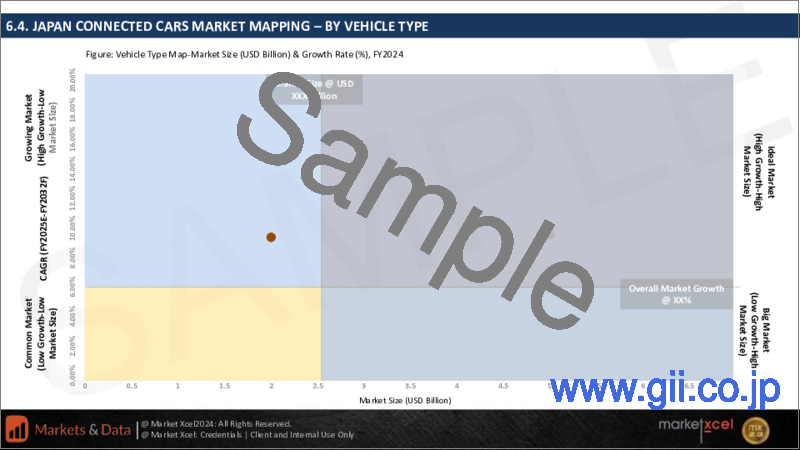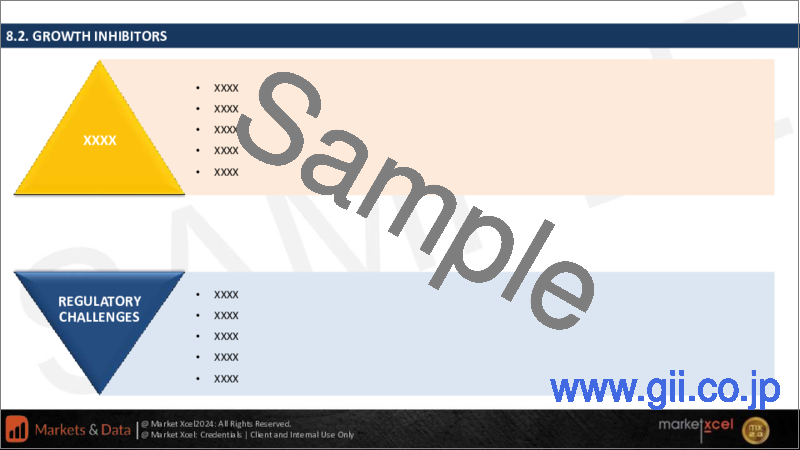|
|
市場調査レポート
商品コード
1346110
日本のコネクテッドカー市場 (2017~2031年):ネットワーク・システムタイプ・コンポーネント・車両タイプ・通信タイプ・販売チャネル・用途・地域別の機会および予測Japan Connected Cars Market Assessment, By Network, By System Type, By Components, By Vehicle Type, By Communication Type, By Sales Channel, By Application, By Region, Opportunities and Forecast, FY2017-FY2031F |
||||||
カスタマイズ可能
|
|||||||
| 日本のコネクテッドカー市場 (2017~2031年):ネットワーク・システムタイプ・コンポーネント・車両タイプ・通信タイプ・販売チャネル・用途・地域別の機会および予測 |
|
出版日: 2023年09月08日
発行: Markets & Data
ページ情報: 英文 109 Pages
納期: 3~5営業日
|
- 全表示
- 概要
- 図表
- 目次
日本のコネクテッドカーの市場規模は、2022年の63億8,000万米ドルから、予測期間中は13.2%のCAGRで推移し、2030年には172億米ドルの規模に成長すると予測されています。
日本のコネクテッドカー市場は、いくつかの重要な要因によって大きな成長を遂げています。まず、シームレスなコネクティビティ、リアルタイムのナビゲーション、車載インフォテインメントに対する消費者の需要の高まりが主要な原動力となっています。日本の消費者は、スマートデバイスと自動車を統合し、より統合されパーソナライズされた運転体験を実現することに強い関心を示しています。
コネクテッドカーの利点に対する認識の高まり
日本のコネクテッドカー市場は、コネクテッドカーに対する消費者の意識の高まりにより、近年大幅な伸びを経験しています。人々の技術リテラシーが高まるにつれ、シームレスな接続性や、リアルタイムナビゲーション、車内エンターテインメント、V2V通信といったインテリジェントな機能を高く評価するようになっています。そのため、コネクテッドカーに対する関心が高まっています。さらに、コネクテッドカーがいかに全体的な運転体験を向上させ、車両性能を最適化し、交通安全を強化できるかを理解することが、消費者の需要を刺激しています。こうした認識が多様なマーケティング戦略、教育イニシアティブ、口コミを通じて広まり続けるにつれて、日本のコネクテッドカー市場は持続的に拡大し、こうした先進自動車技術の採用が拡大する態勢が整えられています。
IoTエコシステムとスマートシティ
日本のIoTエコシステムとスマートシティはコネクテッドカー市場に大きな影響を与えています。日本がインテリジェント都市開発を行う中で、コネクテッドカーは交通インフラにシームレスに統合され、リアルタイムのデータ交換と交通管理の改善を可能にしています。スマートシティは駐車支援と交通流の最適化を提供し、都市モビリティの効率と利便性を高めます。コネクテッドカーとIoTパラダイムおよびスマートシティ構想の融合は、市場の拡大を加速させ、革新的で相互接続された交通ソリューションを特徴とする変革期を到来させています。
技術の進歩
日本のコネクテッドカー市場は、ADAS (先進運転支援システム) やV2X (Vehicle-to-Everything) 通信など、著しい技術進歩を遂げてきました。これらの進歩は、衝突回避、車線逸脱警報、アダプティブクルーズコントロールなどの技術を提供し、自動車の安全性を向上させています。V2X通信は、車両、インフラ、歩行者とのデータ交換を可能にし、交通管理とより安全な運転体験を実現させています。また、5Gネットワークの統合が接続性をさらに強化し、リアルタイムナビゲーション、インフォテインメント、シームレスな無線アップデートを可能にしています。
当レポートでは、日本のコネクテッドカーの市場を調査し、市場の定義と概要、市場規模の推移・予測、各種区分・地域別の詳細分析、産業構造、市場成長への影響因子の分析、ケーススタディ、競合情勢、主要企業のプロファイルなどをまとめています。
目次
第1章 調査手法
第2章 プロジェクトの範囲と定義
第3章 COVID-19の影響
第4章 ロシア・ウクライナ戦争の影響
第5章 エグゼクティブサマリー
第6章 顧客の声
- 人口統計
- ブランドの認知度と想起率
- 購入決定時に考慮される要素
- 製品のカスタマイズ
- アドオン機能の購入媒体
第7章 日本のコネクテッドカー市場の見通し
- 市場規模・予測
- ネットワーク別
- 3G
- 4G-LTE
- 5G
- システムタイプ別
- 組み込みシステム
- テザード
- コンポーネント別
- セントラルゲートウェイ
- ヘッドユニット
- 電子制御ユニット (ECU)
- テレマティクスコントロールユニット (TCU)
- その他
- 車両タイプ別
- 内燃機関 (ICE) 車両
- 電気自動車/ハイブリッド自動車
- 通信タイプ別
- 車両・インフラ間
- 車両・車両間
- 車両・歩行者間
- 車両・クラウド間
- その他
- 販売チャネル別
- OEM)
- アフターマーケット
- 用途別
- ナビゲーション
- セーフティ
- エンターテインメント
- 地域別
- 北部
- 南部
- 中部
- 企業別市場シェア
第8章 市場マッピング
- ネットワーク別
- システムタイプ別
- コンポーネント別
- 車両タイプ別
- 通信タイプ別
- 販売チャネル別
- 用途別
- 地域別
第9章 マクロ環境と産業構造
- 需給分析
- 輸出入分析
- バリューチェーン分析
- PESTEL分析
- ポーターのファイブフォース分析
第10章 市場力学
- 成長促進因子
- 成長抑制因子 (課題・制約)
第11章 主要企業の情勢
- 市場リーダー上位5社の競合マトリックス
- 市場リーダー上位5社の市場収益分析
- M&A・ジョイントベンチャー (該当する場合)
- SWOT分析 (参入5社)
- 特許分析 (該当する場合)
第12章 価格分析
第13章 ケーススタディ
第14章 主要企業の見通し
- Toyota Motor Corporation
- Volvo AG
- Bayerische Motoren Werke AG
- Mercedes-Benz Japan Co., Ltd.
- Volkswagen Group
- Honda Motor Co.
- Nissan Motor Co., Ltd.
- Hyundai Motor Company
- Kia Motors Corporation
- MG Motor
第15章 戦略的推奨事項
第16章 当社について・免責事項
List of Tables
- Table 1. Pricing Analysis of Products from Key Players
- Table 2. Competition Matrix of Top 5 Market Leaders
- Table 3. Mergers & Acquisitions/ Joint Ventures (If Applicable)
- Table 4. About Us - Regions and Countries Where We Have Executed Client Projects
List of Figures
- Figure 1. Japan Connected Cars Market, By Value, In USD Billion, FY2017-FY2031F
- Figure 2. Japan Connected Cars Market, By Volume, In Unit Thousand, FY2017-FY2031F
- Figure 3. Japan Connected Cars Market Share, By Networks, In USD Billion, FY2017-FY2031F
- Figure 4. Japan Connected Cars Market Share, By System Type, In USD Billion, FY2017-FY2031F
- Figure 5. Japan Connected Cars Market Share, By Components, In USD Billion, FY2017-FY2031F
- Figure 6. Japan Connected Cars Market Share, By Vehicle Type, In USD Billion, FY2017-FY2031F
- Figure 7. Japan Connected Cars Market Share, By Communication Type, In USD Billion, FY2017-FY2031F
- Figure 8. Japan Connected Cars Market Share, By Sales Channel, In USD Billion, FY2017-FY2031F
- Figure 9. Japan Connected Cars Market Share, By Application, In USD Billion, FY2017-FY2031F
- Figure 10. Japan Connected Cars Market Share, By Region, In USD Billion, FY2017-FY2031F
- Figure 11. By Networks Map-Market Size (USD Billion) & Growth Rate (%), FY2023
- Figure 12. By System Type Map-Market Size (USD Billion) & Growth Rate (%), FY2023
- Figure 13. By Components Map-Market Size (USD Billion) & Growth Rate (%), FY2023
- Figure 14. By Vehicle Type Map-Market Size (USD Billion) & Growth Rate (%), FY2023
- Figure 15. By Communication Type Map-Market Size (USD Billion) & Growth Rate (%), FY2023
- Figure 16. By Sales Channel Map-Market Size (USD Billion) & Growth Rate (%), FY2023
- Figure 17. By Application Map-Market Size (USD Billion) & Growth Rate (%), FY2023
- Figure 18. By Region Map-Market Size (USD Billion) & Growth Rate (%), FY2023
Japan Connected Cars Market size was valued at USD 6.38 billion in 2022, expected to reach USD 17.2 billion in 2030 with a CAGR of 13.2% for the forecast period between FY2023 and FY2030. The Japan Connected Cars Market is a burgeoning sector encompassing technologically advanced vehicles with internet connectivity and communication systems. These connected cars offer various innovative features and services that enhance the driving experience, improve safety, and revolutionize transportation. The market has been experiencing significant growth, driven by several key factors. First and foremost, increasing consumer demand for seamless connectivity, real-time navigation, and in-car infotainment has been a primary driver. Japanese consumers have shown a strong interest in integrating their smart devices with their vehicles, creating a more integrated and personalized driving experience.
The synergy between automotive manufacturers and technology firms has significantly increased the availability and adoption of connected cars. The Japanese government's support for research and development and a supportive regulatory environment have incubated innovation and capital infusion in the corresponding car sector. Safety-centric applications like V2V and V2I communication have gained traction, aligning with Japan's commitment to road safety. This confluence leads to a promising trajectory for the Japan Connected Cars Market, with significant agreements between Nissan, Honda, and Toyota and telecom companies in 2022. These automotive giants have committed to remuneration for services facilitating seamless communication and unfettered access to online functionalities in their vehicles.
Increasing Awareness of the Benefits of Connected Cars
Japan's connected cars market has experienced a significant increase in recent years due to increased consumer awareness of connected vehicles. As people become more technologically literate, they appreciate seamless connectivity and intelligent features like real-time navigation, in-car entertainment, and V2V communication. This has heightened my curiosity about connected cars. Furthermore, realizing how connected cars can elevate overall driving experiences, optimize vehicle performance, and bolster road safety has instrumentally stimulated consumer demand. As this awareness continues to be disseminated through diverse marketing strategies, educational initiatives, and word-of-mouth, the Japan-connected cars market is poised for sustained expansion and increased adoption of these advanced automotive technologies.
A concrete example is Bentley's introduction of the Bentayga Hybrid Azure in 2023. The Bentley Bentayga Hybrid Azure integrates a potent hybrid powertrain with advanced safety features and infotainment capabilities. Its hybrid technology contributes to reduced emissions and enhanced efficiency, while the vehicle also incorporates state-of-the-art safety systems for heightened driver and passenger security. Additionally, the infotainment features offer a sumptuous and interconnected driving encounter.
Internet of Things (IoT) Ecosystem and Smart Cities
Japan's IoT ecosystem and smart cities have significantly impacted the connected cars market. As Japan develops intelligent urban areas, connected cars integrate seamlessly into transportation infrastructure, enabling real-time data exchange and improved traffic management. Smart cities provide parking assistance and optimization of traffic flow, enhancing urban mobility efficiency and convenience. The fusion of connected cars with the IoT paradigm and smart city initiatives has amplified the market's expansion, ushering in a transformative era characterized by innovative and interconnected transportation solutions.
A notable example is the remarkable strides made by Industry 4.0 and the IoT in 2022, which significantly accelerated the connected and autonomous vehicle market. The advent of 5G technology further amplifies critical applications such as autonomous driving, Vehicle-to-Vehicle (V2V), Vehicle-to-Infrastructure (V2I), Vehicle-to-Network (V2N), and Vehicle-to-Pedestrian (V2P) communications. The attributes of 5G, encompassing reliability, availability, high-speed connectivity, and minimal latency, pave a clear path for establishing a comprehensive Vehicle-to-Everything (V2X) ecosystem. This sophisticated network architecture ensures seamless connectivity and communication among diverse components within the automotive environment, underscoring the dynamic potential of a fully interconnected future.
Technological Advancements
Japan's connected cars market has experienced significant technological advancements, including advanced driver assistance systems (ADAS) and Vehicle-to-Everything (V2X) communication. These advancements improve vehicular safety by providing collision avoidance, lane departure alerts, and adaptive cruise control. V2X communication enables data exchange with vehicles, infrastructure, and pedestrians, enhancing traffic management and safer driving experiences. The integration of 5G networks has further enhanced connectivity, enabling real-time navigation, infotainment, and seamless over-the-air updates.
Simultaneously, the ascent of cloud and edge computing technologies has unlocked efficacious data processing and storage avenues, unlocking the potential for more intricate and feature-enriched connected car applications. These momentous technological strides persist in steering the Japan-connected cars market towards a future characterized by increasingly astute and interconnected mobility solutions. A pertinent illustration of this trend is Skoda's 2022 introduction of the Enyaq iV 60, an electric SUV blending performance with range efficiency. This model features cutting-edge technological prowess, such as an advanced infotainment system, driver assistance functionalities, and an array of connected services. The Enyaq iV 60 exemplifies Skoda's dedication to innovation and sustainability, enriching driving experiences with state-of-the-art technologies.
Impact of COVID-19
The COVID-19 pandemic had a notable impact on the Japan-connected cars market. During the initial phases of the outbreak, production and sales of vehicles experienced significant disruptions due to supply chain issues and lockdown measures. As people refrained from non-essential travel, the demand for connected cars temporarily declined. However, the pandemic highlighted the importance of connected car technologies in ensuring safer and more efficient transportation. As restrictions eased, there was a renewed interest in connected cars, particularly in contactless services and remote diagnostics features. Automakers and technology providers focused on enhancing in-car infotainment and connectivity features to cater to changing consumer preferences. Despite the challenges, the market displayed resilience, with increasing government support and collaboration driving the sector's gradual recovery.
Impact of Russia-Ukraine War
The war did not directly affect the Japan-connected cars market. Nevertheless, it's crucial to contemplate the potential ramifications for the automotive sector. Japan's substantial dependence on importing raw materials and components from multiple nations, including those impacted by the conflict, amplifies the importance. Any disruption in the global supply chain because of the war could affect the manufacturing and availability of connected car technologies. Furthermore, geopolitical tensions induced fluctuations in exchange rates and gave rise to economic uncertainties, impacting consumer confidence and automobile sales in Japan. The evolving scenario necessitates vigilant scrutiny, as protracted conflicts can yield widespread implications for the global economy and the automotive industry, indirectly influencing the Japan-connected cars market. Continuous monitoring remains imperative in assessing the eventual consequences.
Key Players Landscape and Outlook
The Japan Connected Cars Market exhibited a dynamic and competitive arena where various key players made significant contributions. Prominent automotive giants such as Toyota, Honda, and Nissan took the lead by integrating advanced connectivity solutions into their vehicle models. Furthermore, technology powerhouses like Panasonic, Sony, and Denso played crucial roles in supplying essential components and systems for connected cars.
The future of the Japan-connected cars market showed promise, propelled by escalating consumer demand for innovative features and the government's endorsement of smart mobility initiatives. Anticipated collaborations between traditional automakers and technology firms were poised to gain momentum, driving further progress in connected car technologies and nurturing a competitive and inventive market landscape.
As an illustration, Hitachi Astemo, Ltd., Trend Micro Inc., along with its subsidiary VicOne Inc., aimed to expand their existing partnership by 2025, focusing on providing security solutions for connected cars to achieve commercial viability.
Table of Contents
1. Research Methodology
2. Project Scope & Definitions
3. Impact of Covid-19 on Japan Connected Cars Market
4. Impact of Russia-Ukraine War
5. Executive Summary
6. Voice of Customer
- 6.1. Demographics (Age, Geography, Income, etc.)
- 6.2. Brand Recognition and Recall Rate
- 6.3. Factors Considered in Purchase Decision
- 6.3.1. Reliability
- 6.3.2. Design and Safety Features
- 6.3.3. Technology and Entertainment
- 6.3.4. Repair and Maintenance
- 6.3.5. Roadside Assistance
- 6.3.6. Reviews and Recommendations
- 6.4. Product Customization
- 6.5. Medium of Purchase for Add On Features
7. Japan Connected Cars Market Outlook, FY2017-FY2031
- 7.1. Market Size & Forecast
- 7.1.1. By Value
- 7.1.2. By Volume
- 7.2. By Network
- 7.2.1. 3G
- 7.2.2. 4G-LTE
- 7.2.3. 5G
- 7.3. By System Type
- 7.3.1. Embedded System
- 7.3.2. Tethered
- 7.4. By Components
- 7.4.1. Central Gateway
- 7.4.2. Head Unit
- 7.4.3. Electronic Control Unit (ECU)
- 7.4.4. Telematics Control Unit (TCU)
- 7.4.5. Others
- 7.5. By Vehicle Type
- 7.5.1. Internal Combustion Engines (ICE) Vehicle
- 7.5.2. Electric/ Hybrid Vehicle
- 7.6. By Communication Type
- 7.6.1. Vehicle to Infrastructure
- 7.6.2. Vehicle to Vehicle
- 7.6.3. Vehicle to Pedestrian
- 7.6.4. Vehicle to Cloud
- 7.6.5. Others
- 7.7. By Sales Channel
- 7.7.1. Original Equipment Manufacturer (OEM)
- 7.7.2. After Market
- 7.8. By Application
- 7.8.1. Navigation
- 7.8.2. Safety
- 7.8.3. Entertainment
- 7.9. By Region
- 7.9.1. North
- 7.9.2. South
- 7.9.3. Central
- 7.10. By Company Market Share (%), FY2023
8. Market Mapping, FY2023
- 8.1. By Network
- 8.2. By System Type
- 8.3. By Components
- 8.4. By Vehicle Type
- 8.5. By Communication Type
- 8.6. By Sales Channel
- 8.7. By Application
- 8.8. By Region
9. Macro Environment and Industry Structure
- 9.1. Supply Demand Analysis
- 9.2. Import Export Analysis
- 9.3. Value Chain Analysis
- 9.4. PESTEL Analysis
- 9.4.1. Political Factors
- 9.4.2. Economic System
- 9.4.3. Social Implications
- 9.4.4. Technological Advancements
- 9.4.5. Environmental Impacts
- 9.4.6. Legal Compliances and Regulatory Policies (Statutory Bodies Included)
- 9.5. Porter's Five Forces Analysis
- 9.5.1. Supplier Power
- 9.5.2. Buyer Power
- 9.5.3. Substitution Threat
- 9.5.4. Threat from New Entrant
- 9.5.5. Competitive Rivalry
10. Market Dynamics
- 10.1. Growth Drivers
- 10.2. Growth Inhibitors (Challenges and Restraints)
11. Key Players Landscape
- 11.1. Competition Matrix of Top Five Market Leaders
- 11.2. Market Revenue Analysis of Top Five Market Leaders (in %, FY2023)
- 11.3. Mergers and Acquisitions/Joint Ventures (If Applicable)
- 11.4. SWOT Analysis (For Five Market Players)
- 11.5. Patent Analysis (If Applicable)
12. Pricing Analysis
13. Case Studies
14. Key Players Outlook
- 14.1. Toyota Motor Corporation
- 14.1.1. Company Details
- 14.1.2. Key Management Personnel
- 14.1.3. Products & Services
- 14.1.4. Financials (As reported)
- 14.1.5. Key Market Focus & Geographical Presence
- 14.1.6. Recent Developments
- 14.2. Volvo AG
- 14.3. Bayerische Motoren Werke AG
- 14.4. Mercedes-Benz Japan Co., Ltd.
- 14.5. Volkswagen Group
- 14.6. Honda Motor Co.
- 14.7. Nissan Motor Co., Ltd.
- 14.8. Hyundai Motor Company
- 14.9. Kia Motors Corporation
- 14.10. MG Motor






